-
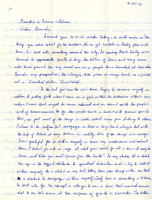 Letter from Nuh Abdul Qaiyum to a fellow revolutionary, April 25, 1975.
Letter from Nuh Abdul Qaiyum to a fellow revolutionary, April 25, 1975. A letter from Nuh Abdul Qaiyum, who is imprisoned, to an unnamed fellow revolutionary. He notifies the recipient that he is ready to move whenever he is called. He also explains the many internal battles that he faces, his efforts in the community to gain control, and his upcoming legal proceedings.
-
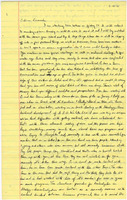 Letter from Nuh Abdul Qaiyum to Frankye Adams-Johnson (Malika), March 14, 1975; March 15, 1975; March 19, 1975.
Letter from Nuh Abdul Qaiyum to Frankye Adams-Johnson (Malika), March 14, 1975; March 15, 1975; March 19, 1975. A letter from Nuh Abdul Qaiyum, who is imprisoned, to his wife Frankye Adams-Johnson (Malika). This letter addresses Black Panther Party business, marriage, and his mental changes during his time in prison. He details the strategy and principles the Party should use to mobilize and spread across America. Letter was written over multiple days.
-
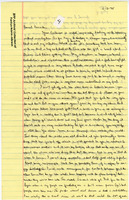 Letter from Nuh Abdul Qaiyum to Frankye Adams-Johnson (Malika), March 13, 1975.
Letter from Nuh Abdul Qaiyum to Frankye Adams-Johnson (Malika), March 13, 1975. A letter from Nuh Abdul Qaiyum, who is imprisoned, to his wife Frankye Adams-Johnson (Malika). He clarifies parts of his previous correspondence and explains the stressful impact of his sentence. He acknowledges his need for more understanding. He updates her on the well being of other members and expresses the gratitude and his trust of her.
-
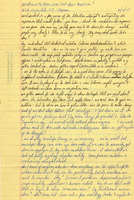 Letter from Ashanti Alston to Nuh Abdul Qaiyum, Cisco, Gab, T.B., and Herman, March 4, 1975.
Letter from Ashanti Alston to Nuh Abdul Qaiyum, Cisco, Gab, T.B., and Herman, March 4, 1975. Ashanti Alston, a Black Liberation Army (BLA) member who was imprisoned for 11 years for a robbery to raise money for the BLA, writes to three fellow imprisoned revolutionaries. He writes about the psychology of the fight for Black liberation and the ways in which their organization should fight for the people.
-
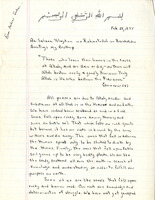 Letter from Bashir Abdul Lugman AS-Sabur to an Unknown Recipient, February 28, 1975.
Letter from Bashir Abdul Lugman AS-Sabur to an Unknown Recipient, February 28, 1975. Bashir Abdul Lugman AS-Sabur writes to a fellow imprisoned person. He compares the Black Panther Party to scattered seeds that can't grow. He mentions the need for their forces to be reunited and how the recipient's religious rights are being violated through the denial of the ability to perform the Muslim practice of Jumma services in prison.
-
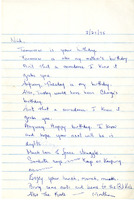 Letter from Martha Pitts to Nuh Abdul Qaiyum, February 27, 1975.
Letter from Martha Pitts to Nuh Abdul Qaiyum, February 27, 1975. A letter to Nuh Abdul Qaiyum from Martha Pitts wishing him a happy birthday while he is in prison. The letter contains birthday messages from others as well, including Assata Shakur (Joanne Chesimard) and Sundiata Acoli. Both of those birthday wishes were relayed through Martha Pitts, who was a friend and confidant to each of them.
-
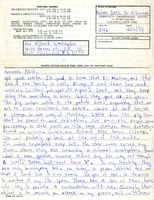 Letter from Harold Simmons (Hodari Diallo) to Nuh Abdul Qaiyum, December 6, 1974.
Letter from Harold Simmons (Hodari Diallo) to Nuh Abdul Qaiyum, December 6, 1974. Harold Simmons (Hodari Diallo), a Black Liberation Army (BLA) member who was imprisoned for a robbery to raise money for the BLA, writes to Nuh Abdul Qaiyum to tell him he was sentenced to 25 years and is currently in segregated lockup, still being harassed by the police. He explores corruption in the community before mentioning an essay he read.
-
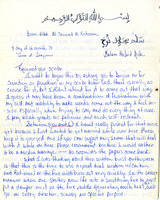 Letter from Raul Abd Al Khaliq to Nuh Abdul Qaiyum, December 4, 1974.
Letter from Raul Abd Al Khaliq to Nuh Abdul Qaiyum, December 4, 1974. Raul Abd Al Khaliq, a fellow imprisoned Black revolutionary, writes to Nuh Abdul Qaiyum. He writes about forming a mass network of communications between all revolutionaries across the country. He feels there is a lack of those willing to take action and that a mass re-organization of the party, their structure, and ideals is necessary.
-
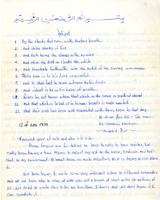 Letter from Raul Abd Al Khaliq to Nuh Abdul Qaiyum, November 12, 1974.
Letter from Raul Abd Al Khaliq to Nuh Abdul Qaiyum, November 12, 1974. Raul Abd Al Khaliq, a fellow imprisoned Black revolutionary, writes to Nuh Abdul Qaiyum. He opens the letter with a passage from the Quran. He then focuses on the mental and conscious change that imprisoned and free revolutionaries must go through to fight the battle properly. He explains the need for an organized structure for resistance groups.
-
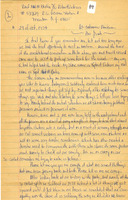 Letter from Raul Abd Al Khaliq to Nuh Abdul Qaiyum, October 29, 1974.
Letter from Raul Abd Al Khaliq to Nuh Abdul Qaiyum, October 29, 1974. Raul Abd Al Khaliq, a fellow imprisoned Black revolutionary, writes to Nuh Abdul Qaiyum. In the letter, he mentions some of Nuh Abdul Qaiyum's writings, and stresses the importance of prisoners communicating with one another. He also lays out a vision and ideology for armed Black resistance, namely the need for centralized leadership.
-
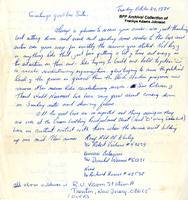 Letter from Sundiata Acoli to fellow revolutionary Sute, October 29, 1974.
Letter from Sundiata Acoli to fellow revolutionary Sute, October 29, 1974. Sundiata Acoli, a member of the Black Liberation Army (BLA) who was convicted in 1974 for the murder of a cop, writes to fellow revolutionary Sute. He addresses his lack of writing, as he is trying to organize revolutionaries in prison. He tells Sute the location of other brothers in the prison and news of their court proceedings.
-
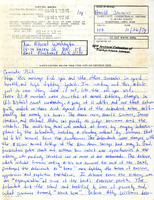 Letter from Harold Simmons (Hodari Diallo) to Nuh Abdul Qaiyum, October 26, 1974.
Letter from Harold Simmons (Hodari Diallo) to Nuh Abdul Qaiyum, October 26, 1974. Harold Simmons (Hodari Diallo), a Black Liberation Army (BLA) member who was imprisoned for a robbery to raise money for the BLA, writes to Nuh Abdul Qaiyum. He copies an article detailing his and two other members' court proceedings. He explains their mission was to disrupt the court system, and believes they achieved a victory for the people.
-
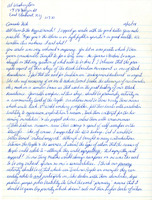 Letter from Ashanti Alston to Nuh Abdul Qaiyum, October 16, 1974.
Letter from Ashanti Alston to Nuh Abdul Qaiyum, October 16, 1974. Ashanti Alston, a Black Liberation Army (BLA) member who was imprisoned for 11 years for a robbery to raise money for the BLA, writes to Nuh Abdul Qaiyum, asking which methods should be used to communicate with the people and the best actions to take that will instill unity in the community. He also writes about his court proceedings.
-
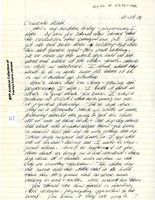 Letter from Gunnie James Haskins to Noah (Nuh Abdul Qaiyum), October 10, 1974.
Letter from Gunnie James Haskins to Noah (Nuh Abdul Qaiyum), October 10, 1974. Gunnie James Haskins, a Black Liberation Army (BLA) member who was imprisoned for a robbery to raise money for the BLA, is writing to update Nuh Abdul Qaiyum of his current condition and the treatment of the other prisoners. He tells him of their court proceedings and gives his idea for a collaborative book about the BLA.
-
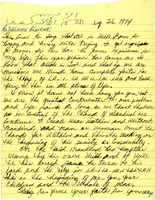 Letter from Tahiar Bashir Abu Buthair Adu Hakim to an Unknown Recipient, August 26, 1974.
Letter from Tahiar Bashir Abu Buthair Adu Hakim to an Unknown Recipient, August 26, 1974. Tahiar Bashir Abu Buthair Adu Hakim explains the importance of keeping the faith as the recipient is separated from their children. She offers to take care of the children and gives advice to the recipient.
-
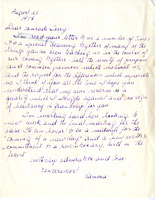 Letter from Ramona to Terry, both members of the Black Panther Party, August 1, 1974.
Letter from Ramona to Terry, both members of the Black Panther Party, August 1, 1974. A letter from Ramona to Terry. She mentions the letters received and the great content of them. Romona writes about her reserve before mentioning that she has been chosen to be a midwife for an upcoming pregnancy happening in the forest. Lastly, she sends her love.
-
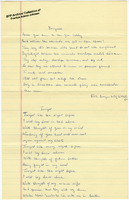 Poems by Nuh Abdul Qaiyum, March 16, 1974.
Poems by Nuh Abdul Qaiyum, March 16, 1974. Poems by Nuh Abdul Qaiyum, who was sentenced to prison in 1975 for a 1971 Black Liberation Army (BLA) connected shooting of police officers in New York. This collection of poems is titled "I am Told" and explores themes such as freedom, humanity, and emotion.
-
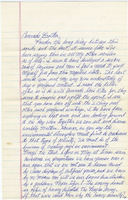 Letter from Pedro Monges (Chango Caribe) to Nuh Abdul Qaiyum, February 22, 1974.
Letter from Pedro Monges (Chango Caribe) to Nuh Abdul Qaiyum, February 22, 1974. Pedro Monges (Chango Caribe), who was sentenced to prison in 1973 on robbery and weapons charges in connection with a Black Liberation Army (BLA) robbery, writes to Nuh Abdul Qaiyum to apologize for the delay between letters. He writes that he is hopeful for the future because their fight is a natural one that the people must get serious about.
-
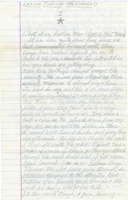 Letter from Pedro Monges (Chango Caribe) to Nuh Abdul Qaiyum, November 12, 1973.
Letter from Pedro Monges (Chango Caribe) to Nuh Abdul Qaiyum, November 12, 1973. Pedro Monges (Chango Caribe), who was sentenced to prison in 1973 on robbery and weapons charges in connection with a Black Liberation Army (BLA) robbery, writes to Nuh Abdul Qaiyum to explain his current conditions and treatment in jail, saying he is under extreme surveillance. He writes about his newly born son, case proceedings, and other news.
-
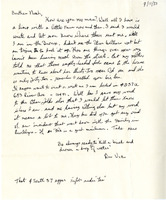 Letter from Victor Cumberbatch to Nuh Abdul Qaiyum, September 11, 1973.
Letter from Victor Cumberbatch to Nuh Abdul Qaiyum, September 11, 1973. Victor Cumberbatch, who was sentenced to prison in 1973 on robbery and weapons charges in connection with a Black Liberation Army (BLA) robbery, writes to update Albert Washington (Nuh Abdul Qaiyum) on his physical wellbeing and where he is serving his prison sentence. He asks if he has heard anything about an incident in Brooklyn.
-
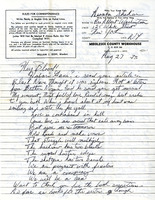 Letter from Joanne Chesimard (Assata Shakur) to Nuh Abdul Qaiyum, August 27, 1973.
Letter from Joanne Chesimard (Assata Shakur) to Nuh Abdul Qaiyum, August 27, 1973. Written on Middlesex County Workhouse letterhead, where Joanne Chesimard (Assata Shakur) was being held in connection with a 1973 police shooting. She writes to Nuh Abdul Qaiyum that she heard about his marriage and wrote a love poem for them. She thanks him for his book suggestions and writes about the other prisoner's attitude toward books.
-
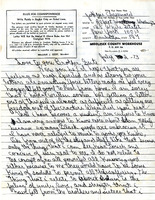 Letter from Joanne Chesimard (Assata Shakur) to Nuh Abdul Qaiyum, July 2, 1973.
Letter from Joanne Chesimard (Assata Shakur) to Nuh Abdul Qaiyum, July 2, 1973. Written on Middlesex County Workhouse letterhead, where Joanne Chesimard (Assata Shakur) was being held in connection with a 1973 police shooting. She writes to Nuh Abdul Qaiyumin in response to his letters and to catch up. She notes that she is hesitant toward religion, but believes Islam teaches the mental processes needed for revolution.
-
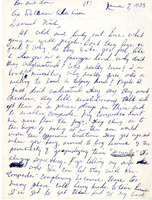 Letter from Unknown Sender to Nuh Abdul Qaiyum, June 7, 1973.
Letter from Unknown Sender to Nuh Abdul Qaiyum, June 7, 1973. The unknown sender and fellow revolutionary writes to Nuh Abdul Qaiyum, who at this time was being held awaiting trial for a 1971 police shooting, to get some feelings off of their chest about the community, the Black Panther Party, and how people behave. They compare the way they are both treated and viewed by the people around them.
-
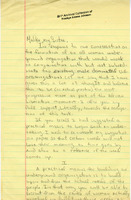 Letter from Unknown Sender to Frankye Adams-Johnson (Malika), date unknown.
Letter from Unknown Sender to Frankye Adams-Johnson (Malika), date unknown. The sender, following up with Frankye Adams-Johnson (Malika) on a previous conversation, writes to her regarding her idea to start a woman-led Black liberation group. The sender gives steps on creating a military intelligence apparatus that will serve the women's militia and connect them to other organizations in the struggle for Black liberation.
-
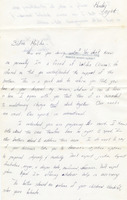 Letter from Hasan Sababa to Frankye Adams-Johnson (Malika), Monday night (day, month, year, unknown).
Letter from Hasan Sababa to Frankye Adams-Johnson (Malika), Monday night (day, month, year, unknown). Hasan Sababa is writing to introduce himself as a fellow revolutionary. He makes himself and his revolutionary brothers available to her at their full disposal. He writes that he does not know the details of her case, so can’t speak on it, but does give his viewpoint of the American court system, telling her not to expect justice.
 Letter from Nuh Abdul Qaiyum to a fellow revolutionary, April 25, 1975. A letter from Nuh Abdul Qaiyum, who is imprisoned, to an unnamed fellow revolutionary. He notifies the recipient that he is ready to move whenever he is called. He also explains the many internal battles that he faces, his efforts in the community to gain control, and his upcoming legal proceedings.
Letter from Nuh Abdul Qaiyum to a fellow revolutionary, April 25, 1975. A letter from Nuh Abdul Qaiyum, who is imprisoned, to an unnamed fellow revolutionary. He notifies the recipient that he is ready to move whenever he is called. He also explains the many internal battles that he faces, his efforts in the community to gain control, and his upcoming legal proceedings. Letter from Nuh Abdul Qaiyum to Frankye Adams-Johnson (Malika), March 14, 1975; March 15, 1975; March 19, 1975. A letter from Nuh Abdul Qaiyum, who is imprisoned, to his wife Frankye Adams-Johnson (Malika). This letter addresses Black Panther Party business, marriage, and his mental changes during his time in prison. He details the strategy and principles the Party should use to mobilize and spread across America. Letter was written over multiple days.
Letter from Nuh Abdul Qaiyum to Frankye Adams-Johnson (Malika), March 14, 1975; March 15, 1975; March 19, 1975. A letter from Nuh Abdul Qaiyum, who is imprisoned, to his wife Frankye Adams-Johnson (Malika). This letter addresses Black Panther Party business, marriage, and his mental changes during his time in prison. He details the strategy and principles the Party should use to mobilize and spread across America. Letter was written over multiple days. Letter from Nuh Abdul Qaiyum to Frankye Adams-Johnson (Malika), March 13, 1975. A letter from Nuh Abdul Qaiyum, who is imprisoned, to his wife Frankye Adams-Johnson (Malika). He clarifies parts of his previous correspondence and explains the stressful impact of his sentence. He acknowledges his need for more understanding. He updates her on the well being of other members and expresses the gratitude and his trust of her.
Letter from Nuh Abdul Qaiyum to Frankye Adams-Johnson (Malika), March 13, 1975. A letter from Nuh Abdul Qaiyum, who is imprisoned, to his wife Frankye Adams-Johnson (Malika). He clarifies parts of his previous correspondence and explains the stressful impact of his sentence. He acknowledges his need for more understanding. He updates her on the well being of other members and expresses the gratitude and his trust of her. Letter from Ashanti Alston to Nuh Abdul Qaiyum, Cisco, Gab, T.B., and Herman, March 4, 1975. Ashanti Alston, a Black Liberation Army (BLA) member who was imprisoned for 11 years for a robbery to raise money for the BLA, writes to three fellow imprisoned revolutionaries. He writes about the psychology of the fight for Black liberation and the ways in which their organization should fight for the people.
Letter from Ashanti Alston to Nuh Abdul Qaiyum, Cisco, Gab, T.B., and Herman, March 4, 1975. Ashanti Alston, a Black Liberation Army (BLA) member who was imprisoned for 11 years for a robbery to raise money for the BLA, writes to three fellow imprisoned revolutionaries. He writes about the psychology of the fight for Black liberation and the ways in which their organization should fight for the people. Letter from Bashir Abdul Lugman AS-Sabur to an Unknown Recipient, February 28, 1975. Bashir Abdul Lugman AS-Sabur writes to a fellow imprisoned person. He compares the Black Panther Party to scattered seeds that can't grow. He mentions the need for their forces to be reunited and how the recipient's religious rights are being violated through the denial of the ability to perform the Muslim practice of Jumma services in prison.
Letter from Bashir Abdul Lugman AS-Sabur to an Unknown Recipient, February 28, 1975. Bashir Abdul Lugman AS-Sabur writes to a fellow imprisoned person. He compares the Black Panther Party to scattered seeds that can't grow. He mentions the need for their forces to be reunited and how the recipient's religious rights are being violated through the denial of the ability to perform the Muslim practice of Jumma services in prison. Letter from Martha Pitts to Nuh Abdul Qaiyum, February 27, 1975. A letter to Nuh Abdul Qaiyum from Martha Pitts wishing him a happy birthday while he is in prison. The letter contains birthday messages from others as well, including Assata Shakur (Joanne Chesimard) and Sundiata Acoli. Both of those birthday wishes were relayed through Martha Pitts, who was a friend and confidant to each of them.
Letter from Martha Pitts to Nuh Abdul Qaiyum, February 27, 1975. A letter to Nuh Abdul Qaiyum from Martha Pitts wishing him a happy birthday while he is in prison. The letter contains birthday messages from others as well, including Assata Shakur (Joanne Chesimard) and Sundiata Acoli. Both of those birthday wishes were relayed through Martha Pitts, who was a friend and confidant to each of them. Letter from Harold Simmons (Hodari Diallo) to Nuh Abdul Qaiyum, December 6, 1974. Harold Simmons (Hodari Diallo), a Black Liberation Army (BLA) member who was imprisoned for a robbery to raise money for the BLA, writes to Nuh Abdul Qaiyum to tell him he was sentenced to 25 years and is currently in segregated lockup, still being harassed by the police. He explores corruption in the community before mentioning an essay he read.
Letter from Harold Simmons (Hodari Diallo) to Nuh Abdul Qaiyum, December 6, 1974. Harold Simmons (Hodari Diallo), a Black Liberation Army (BLA) member who was imprisoned for a robbery to raise money for the BLA, writes to Nuh Abdul Qaiyum to tell him he was sentenced to 25 years and is currently in segregated lockup, still being harassed by the police. He explores corruption in the community before mentioning an essay he read. Letter from Raul Abd Al Khaliq to Nuh Abdul Qaiyum, December 4, 1974. Raul Abd Al Khaliq, a fellow imprisoned Black revolutionary, writes to Nuh Abdul Qaiyum. He writes about forming a mass network of communications between all revolutionaries across the country. He feels there is a lack of those willing to take action and that a mass re-organization of the party, their structure, and ideals is necessary.
Letter from Raul Abd Al Khaliq to Nuh Abdul Qaiyum, December 4, 1974. Raul Abd Al Khaliq, a fellow imprisoned Black revolutionary, writes to Nuh Abdul Qaiyum. He writes about forming a mass network of communications between all revolutionaries across the country. He feels there is a lack of those willing to take action and that a mass re-organization of the party, their structure, and ideals is necessary. Letter from Raul Abd Al Khaliq to Nuh Abdul Qaiyum, November 12, 1974. Raul Abd Al Khaliq, a fellow imprisoned Black revolutionary, writes to Nuh Abdul Qaiyum. He opens the letter with a passage from the Quran. He then focuses on the mental and conscious change that imprisoned and free revolutionaries must go through to fight the battle properly. He explains the need for an organized structure for resistance groups.
Letter from Raul Abd Al Khaliq to Nuh Abdul Qaiyum, November 12, 1974. Raul Abd Al Khaliq, a fellow imprisoned Black revolutionary, writes to Nuh Abdul Qaiyum. He opens the letter with a passage from the Quran. He then focuses on the mental and conscious change that imprisoned and free revolutionaries must go through to fight the battle properly. He explains the need for an organized structure for resistance groups. Letter from Raul Abd Al Khaliq to Nuh Abdul Qaiyum, October 29, 1974. Raul Abd Al Khaliq, a fellow imprisoned Black revolutionary, writes to Nuh Abdul Qaiyum. In the letter, he mentions some of Nuh Abdul Qaiyum's writings, and stresses the importance of prisoners communicating with one another. He also lays out a vision and ideology for armed Black resistance, namely the need for centralized leadership.
Letter from Raul Abd Al Khaliq to Nuh Abdul Qaiyum, October 29, 1974. Raul Abd Al Khaliq, a fellow imprisoned Black revolutionary, writes to Nuh Abdul Qaiyum. In the letter, he mentions some of Nuh Abdul Qaiyum's writings, and stresses the importance of prisoners communicating with one another. He also lays out a vision and ideology for armed Black resistance, namely the need for centralized leadership. Letter from Sundiata Acoli to fellow revolutionary Sute, October 29, 1974. Sundiata Acoli, a member of the Black Liberation Army (BLA) who was convicted in 1974 for the murder of a cop, writes to fellow revolutionary Sute. He addresses his lack of writing, as he is trying to organize revolutionaries in prison. He tells Sute the location of other brothers in the prison and news of their court proceedings.
Letter from Sundiata Acoli to fellow revolutionary Sute, October 29, 1974. Sundiata Acoli, a member of the Black Liberation Army (BLA) who was convicted in 1974 for the murder of a cop, writes to fellow revolutionary Sute. He addresses his lack of writing, as he is trying to organize revolutionaries in prison. He tells Sute the location of other brothers in the prison and news of their court proceedings. Letter from Harold Simmons (Hodari Diallo) to Nuh Abdul Qaiyum, October 26, 1974. Harold Simmons (Hodari Diallo), a Black Liberation Army (BLA) member who was imprisoned for a robbery to raise money for the BLA, writes to Nuh Abdul Qaiyum. He copies an article detailing his and two other members' court proceedings. He explains their mission was to disrupt the court system, and believes they achieved a victory for the people.
Letter from Harold Simmons (Hodari Diallo) to Nuh Abdul Qaiyum, October 26, 1974. Harold Simmons (Hodari Diallo), a Black Liberation Army (BLA) member who was imprisoned for a robbery to raise money for the BLA, writes to Nuh Abdul Qaiyum. He copies an article detailing his and two other members' court proceedings. He explains their mission was to disrupt the court system, and believes they achieved a victory for the people. Letter from Ashanti Alston to Nuh Abdul Qaiyum, October 16, 1974. Ashanti Alston, a Black Liberation Army (BLA) member who was imprisoned for 11 years for a robbery to raise money for the BLA, writes to Nuh Abdul Qaiyum, asking which methods should be used to communicate with the people and the best actions to take that will instill unity in the community. He also writes about his court proceedings.
Letter from Ashanti Alston to Nuh Abdul Qaiyum, October 16, 1974. Ashanti Alston, a Black Liberation Army (BLA) member who was imprisoned for 11 years for a robbery to raise money for the BLA, writes to Nuh Abdul Qaiyum, asking which methods should be used to communicate with the people and the best actions to take that will instill unity in the community. He also writes about his court proceedings. Letter from Gunnie James Haskins to Noah (Nuh Abdul Qaiyum), October 10, 1974. Gunnie James Haskins, a Black Liberation Army (BLA) member who was imprisoned for a robbery to raise money for the BLA, is writing to update Nuh Abdul Qaiyum of his current condition and the treatment of the other prisoners. He tells him of their court proceedings and gives his idea for a collaborative book about the BLA.
Letter from Gunnie James Haskins to Noah (Nuh Abdul Qaiyum), October 10, 1974. Gunnie James Haskins, a Black Liberation Army (BLA) member who was imprisoned for a robbery to raise money for the BLA, is writing to update Nuh Abdul Qaiyum of his current condition and the treatment of the other prisoners. He tells him of their court proceedings and gives his idea for a collaborative book about the BLA. Letter from Tahiar Bashir Abu Buthair Adu Hakim to an Unknown Recipient, August 26, 1974. Tahiar Bashir Abu Buthair Adu Hakim explains the importance of keeping the faith as the recipient is separated from their children. She offers to take care of the children and gives advice to the recipient.
Letter from Tahiar Bashir Abu Buthair Adu Hakim to an Unknown Recipient, August 26, 1974. Tahiar Bashir Abu Buthair Adu Hakim explains the importance of keeping the faith as the recipient is separated from their children. She offers to take care of the children and gives advice to the recipient. Letter from Ramona to Terry, both members of the Black Panther Party, August 1, 1974. A letter from Ramona to Terry. She mentions the letters received and the great content of them. Romona writes about her reserve before mentioning that she has been chosen to be a midwife for an upcoming pregnancy happening in the forest. Lastly, she sends her love.
Letter from Ramona to Terry, both members of the Black Panther Party, August 1, 1974. A letter from Ramona to Terry. She mentions the letters received and the great content of them. Romona writes about her reserve before mentioning that she has been chosen to be a midwife for an upcoming pregnancy happening in the forest. Lastly, she sends her love. Poems by Nuh Abdul Qaiyum, March 16, 1974. Poems by Nuh Abdul Qaiyum, who was sentenced to prison in 1975 for a 1971 Black Liberation Army (BLA) connected shooting of police officers in New York. This collection of poems is titled "I am Told" and explores themes such as freedom, humanity, and emotion.
Poems by Nuh Abdul Qaiyum, March 16, 1974. Poems by Nuh Abdul Qaiyum, who was sentenced to prison in 1975 for a 1971 Black Liberation Army (BLA) connected shooting of police officers in New York. This collection of poems is titled "I am Told" and explores themes such as freedom, humanity, and emotion. Letter from Pedro Monges (Chango Caribe) to Nuh Abdul Qaiyum, February 22, 1974. Pedro Monges (Chango Caribe), who was sentenced to prison in 1973 on robbery and weapons charges in connection with a Black Liberation Army (BLA) robbery, writes to Nuh Abdul Qaiyum to apologize for the delay between letters. He writes that he is hopeful for the future because their fight is a natural one that the people must get serious about.
Letter from Pedro Monges (Chango Caribe) to Nuh Abdul Qaiyum, February 22, 1974. Pedro Monges (Chango Caribe), who was sentenced to prison in 1973 on robbery and weapons charges in connection with a Black Liberation Army (BLA) robbery, writes to Nuh Abdul Qaiyum to apologize for the delay between letters. He writes that he is hopeful for the future because their fight is a natural one that the people must get serious about. Letter from Pedro Monges (Chango Caribe) to Nuh Abdul Qaiyum, November 12, 1973. Pedro Monges (Chango Caribe), who was sentenced to prison in 1973 on robbery and weapons charges in connection with a Black Liberation Army (BLA) robbery, writes to Nuh Abdul Qaiyum to explain his current conditions and treatment in jail, saying he is under extreme surveillance. He writes about his newly born son, case proceedings, and other news.
Letter from Pedro Monges (Chango Caribe) to Nuh Abdul Qaiyum, November 12, 1973. Pedro Monges (Chango Caribe), who was sentenced to prison in 1973 on robbery and weapons charges in connection with a Black Liberation Army (BLA) robbery, writes to Nuh Abdul Qaiyum to explain his current conditions and treatment in jail, saying he is under extreme surveillance. He writes about his newly born son, case proceedings, and other news. Letter from Victor Cumberbatch to Nuh Abdul Qaiyum, September 11, 1973. Victor Cumberbatch, who was sentenced to prison in 1973 on robbery and weapons charges in connection with a Black Liberation Army (BLA) robbery, writes to update Albert Washington (Nuh Abdul Qaiyum) on his physical wellbeing and where he is serving his prison sentence. He asks if he has heard anything about an incident in Brooklyn.
Letter from Victor Cumberbatch to Nuh Abdul Qaiyum, September 11, 1973. Victor Cumberbatch, who was sentenced to prison in 1973 on robbery and weapons charges in connection with a Black Liberation Army (BLA) robbery, writes to update Albert Washington (Nuh Abdul Qaiyum) on his physical wellbeing and where he is serving his prison sentence. He asks if he has heard anything about an incident in Brooklyn. Letter from Joanne Chesimard (Assata Shakur) to Nuh Abdul Qaiyum, August 27, 1973. Written on Middlesex County Workhouse letterhead, where Joanne Chesimard (Assata Shakur) was being held in connection with a 1973 police shooting. She writes to Nuh Abdul Qaiyum that she heard about his marriage and wrote a love poem for them. She thanks him for his book suggestions and writes about the other prisoner's attitude toward books.
Letter from Joanne Chesimard (Assata Shakur) to Nuh Abdul Qaiyum, August 27, 1973. Written on Middlesex County Workhouse letterhead, where Joanne Chesimard (Assata Shakur) was being held in connection with a 1973 police shooting. She writes to Nuh Abdul Qaiyum that she heard about his marriage and wrote a love poem for them. She thanks him for his book suggestions and writes about the other prisoner's attitude toward books. Letter from Joanne Chesimard (Assata Shakur) to Nuh Abdul Qaiyum, July 2, 1973. Written on Middlesex County Workhouse letterhead, where Joanne Chesimard (Assata Shakur) was being held in connection with a 1973 police shooting. She writes to Nuh Abdul Qaiyumin in response to his letters and to catch up. She notes that she is hesitant toward religion, but believes Islam teaches the mental processes needed for revolution.
Letter from Joanne Chesimard (Assata Shakur) to Nuh Abdul Qaiyum, July 2, 1973. Written on Middlesex County Workhouse letterhead, where Joanne Chesimard (Assata Shakur) was being held in connection with a 1973 police shooting. She writes to Nuh Abdul Qaiyumin in response to his letters and to catch up. She notes that she is hesitant toward religion, but believes Islam teaches the mental processes needed for revolution. Letter from Unknown Sender to Nuh Abdul Qaiyum, June 7, 1973. The unknown sender and fellow revolutionary writes to Nuh Abdul Qaiyum, who at this time was being held awaiting trial for a 1971 police shooting, to get some feelings off of their chest about the community, the Black Panther Party, and how people behave. They compare the way they are both treated and viewed by the people around them.
Letter from Unknown Sender to Nuh Abdul Qaiyum, June 7, 1973. The unknown sender and fellow revolutionary writes to Nuh Abdul Qaiyum, who at this time was being held awaiting trial for a 1971 police shooting, to get some feelings off of their chest about the community, the Black Panther Party, and how people behave. They compare the way they are both treated and viewed by the people around them. Letter from Unknown Sender to Frankye Adams-Johnson (Malika), date unknown. The sender, following up with Frankye Adams-Johnson (Malika) on a previous conversation, writes to her regarding her idea to start a woman-led Black liberation group. The sender gives steps on creating a military intelligence apparatus that will serve the women's militia and connect them to other organizations in the struggle for Black liberation.
Letter from Unknown Sender to Frankye Adams-Johnson (Malika), date unknown. The sender, following up with Frankye Adams-Johnson (Malika) on a previous conversation, writes to her regarding her idea to start a woman-led Black liberation group. The sender gives steps on creating a military intelligence apparatus that will serve the women's militia and connect them to other organizations in the struggle for Black liberation. Letter from Hasan Sababa to Frankye Adams-Johnson (Malika), Monday night (day, month, year, unknown). Hasan Sababa is writing to introduce himself as a fellow revolutionary. He makes himself and his revolutionary brothers available to her at their full disposal. He writes that he does not know the details of her case, so can’t speak on it, but does give his viewpoint of the American court system, telling her not to expect justice.
Letter from Hasan Sababa to Frankye Adams-Johnson (Malika), Monday night (day, month, year, unknown). Hasan Sababa is writing to introduce himself as a fellow revolutionary. He makes himself and his revolutionary brothers available to her at their full disposal. He writes that he does not know the details of her case, so can’t speak on it, but does give his viewpoint of the American court system, telling her not to expect justice.